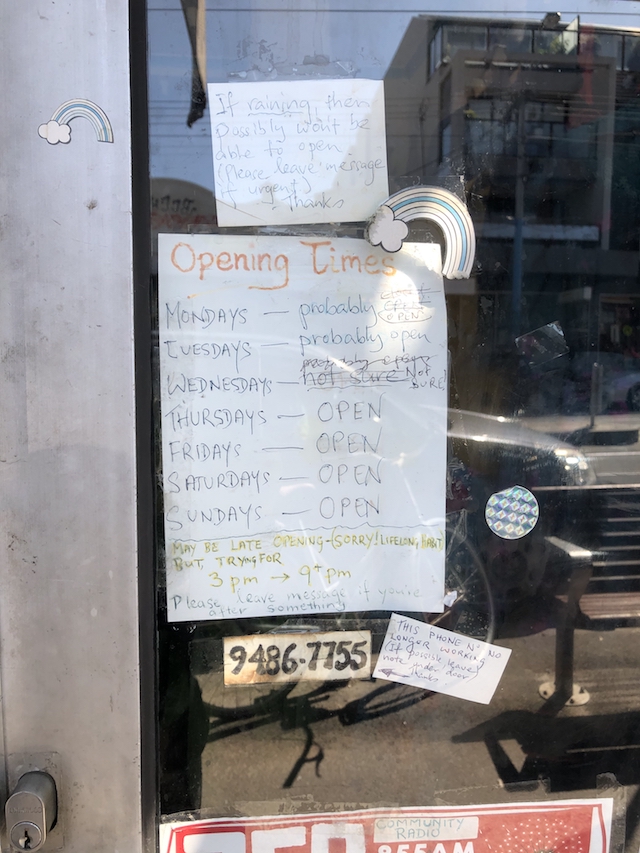Unlock the Magic in Your Story Now
Get the Free 20 questions to Ask Before Launching Your Idea workbook when you sign up for occasional updates.
Get the Free 20 questions to Ask Before Launching Your Idea workbook when you sign up for occasional updates.
Articles filed in: Meaningful Work
The Efficiency Paradox
filed in Meaningful Work, Worldview

The young woman got off the tram, carried along amid the throng on their way to the various law firms along Collins Street. She walked briskly, heels clacking, her big Beats headphones clamped over her ears. Two bags were slung across her body. One leather contained her laptop, the other made of cloth held a ball of the bright yellow wool trailing from the needles she held in her hands.
Her hands worked furiously as she walked—one plain, one purl, one plain, one purl. The needles continued to click in and out through the yellow wool as she knitted, listened and walked, walked, knitted and listened—without ever needing to stop or look down. She’d have a podcast and half a scarf under her belt before she reached the office.
This woman was making efficient use of her time, but I’m not sure that’s the same as making the most of it. Just because it’s possible to do two or three things at once doesn’t mean we should.
What are we trading for efficiency? What’s the cost to us?
Image by Ross Sneddon
Promises Worth Keeping
filed in Meaningful Work, Success, Worldview

While I was out walking this weekend I came across a sign on a shop door detailing the opening times. It read:
MONDAYS—probably
TUESDAYS-probably
WEDNESDAYS—probably not sure Not SURE!
THURSDAYS—OPEN
FRIDAYS—OPEN
SATURDAYS—OPEN
SUNDAYS—OPEN
MAY BE LATER FOR OPENING (SORRY! LIFELONG HABIT)
BUT TRYING FOR 3 PM-9 PM
It’s easy for a sometimes probably, to become a maybe never.
What promises are you making to yourself and others that are worth keeping?
This is a photo of the sign.

Image by Richard Balog
The Sliding Scale Of Ambition
filed in Meaningful Work, Success
 There are many ways Leanne could leverage the success of her popular hair salon.
There are many ways Leanne could leverage the success of her popular hair salon.
She could extend her opening hours or enter national competitions. She could hire more stylists and open more branches. She could create a line of hair products or franchise her business process and ideas.
But Leanne chooses to do none of these things—not because she isn’t ambitious, but because success for her is delivering the best experience in one exceptional salon, to earn the trust and loyalty of delighted customers.
We sometimes fall into the trap of shooting for someone else’s vision of success. We seize every opportunity because we can, and not because it’s what we really want.
Ambition is always on a sliding scale.
What does being successful mean to you? What do you want?
Image by Aw Creative
On Strengths
filed in Meaningful Work, Story Skills, Success
 If a friend or colleague asked you to list their strengths, I’m guessing you’d have no trouble coming up several of their attributes.
If a friend or colleague asked you to list their strengths, I’m guessing you’d have no trouble coming up several of their attributes.
But if they asked you to share a list of your strengths you’d likely hesitate.
Why is that?
We don’t spend a lot of time reflecting on our skills and talents, because we’ve been conditioned to be humble.
We largely focus on our ‘areas for improvement—the things we lack confidence and competence in, to the detriment of our gifts and our genius.
Of course, we can improve our weakness. But we can also amplify our strengths.
What do you already bring to the world and how can you do more of that?
Image by Annie Spratt
Opportunity Knocks
filed in Meaningful Work, Success

There was a talent show on television when I was a child called, Opportunity Knocks. It wasn’t unlike some of the reality talent shows broadcast on TV today. It was lower budget and had a lot less glitz and glamour.
Prospective contestants wrote to the show’s producers via snail mail pitching to audition. I doubt anybody knew the criteria for being picked to appear on the show. I know I didn’t have a clue how to improve my chances when I sent off a letter to the address that flashed across the screen at the end of the show. Luckily my pitch wasn’t successful because I was equally clueless about what my winning act would be if I were chosen.
Opportunity is defined as—a time or set of circumstances that makes it possible to do something.
It’s believed to be that fortuitous moment when the stars align. Conventional wisdom reminds us that the chance of success occurs when opportunity knocks. This implies that opportunity is a happening that’s out of our control.
The truth is we don’t simply wait for opportunity to arrive at our door, we invite it in. We start walking down the road to greet it, one foot in front of the other.
Image by Kelan Chad
Say It Like You Mean It
filed in Marketing, Meaningful Work, Story Skills

Empathy is an essential skill for anyone who wants to make a living by serving others.
A big part of our job is to show those people that we see, hear and can help them.
But there’s a fine line between fake intimacy and genuine sincerity in a sales conversation. We’ve all been subjected to both.
The good news is we each get to choose which posture to adopt.
You can say it like you mean it, or better—you can mean it before you say it.
The integrity of sincerity wins in the long run.
Image by Adam Jang
The Best Stories Are Lived
filed in Marketing, Meaningful Work, Story Skills, Storytelling
 It’s Sunday afternoon, and I’m visiting the smallest branch of my favourite chocolate shop. It’s a fourth-generation, family-owned and operated business, and it shows.
It’s Sunday afternoon, and I’m visiting the smallest branch of my favourite chocolate shop. It’s a fourth-generation, family-owned and operated business, and it shows.
The enthusiasm of the assistants is palpable.
‘I’ve never worked for a company like this,’ the woman behind the counter says. ‘I’ve been here for five years, and I love it!’
When I ask why she talks about how much the owners care.
‘They’d do anything for us. They even get up on a ladder to change our lightbulbs. They remember our birthdays. They want the best for our customers and us.’
As the conversation progresses, ‘they’ becomes ‘we’.
‘We don’t export. We’re just proud to sell a beautiful Australian product at home.’
Storytelling is more than clever copy. It’s the act of showing up, with intention.
Your story is more than a tagline or a positioning statement—it’s not only what you say—it’s what you do.
The best stories are not just told, they are lived.
Image by Avant
Better For Your Being Here
filed in Meaningful Work

In our rush to make a living, we sometimes lose touch with the reason our work matters.
In our impatience to make other people care, we often lose sight of why we started.
In our eagerness to make an extraordinary impact, we forget it’s in ordinary moments that we leave the world better for our being here.
Image by Adrià Crehuet Cano
On Tipping Points
filed in Meaningful Work, Success

Life, as the well-worn adage, written on many a motivational fridge magnet, reminds us, is a journey, not a destination.
We know this. Yet we strive for our tipping point—that moment when the series of small steps we’ve taken towards our goal will be significant enough to cause the big breakthrough we’ve been waiting for.
The truth is, there is no singular tipping point that makes us immeasurably better than we were the day before. Everything we do is work in progress, and we’ll encounter multiple tipping points by taking the next best step we can on our journey.
Image by Curtis MacNewton
Valuing Your Expertise And Effort
filed in Meaningful Work, Strategy, Success

My dad had many manual jobs during his working life, but the one he loved most was being a painter and decorator. It was the only job he did, where he could stand back and find joy in his creative output at the end of the day. Painting was something he could say he was good at. His reputation preceded him.
His customers loved the end result—the pristine room, a freshly glossed front door. What they didn’t always see was the process that made the finished product great—the hours of preparing, sanding and undercoating the wood. The final coat was only as good as the effort that went into the layers of paint beneath it.
And so it goes for us and our work too.
Your clients aren’t just buying the result—they are investing in the value of your expertise and effort. You must remember to tell that story.
*Do you need help to reflect on the next right step for building your business or career? Then our group mentorship experience at the Right Company might be for you. We’re accepting applications for a handful of new members this week.
Image by Fernando Butcher